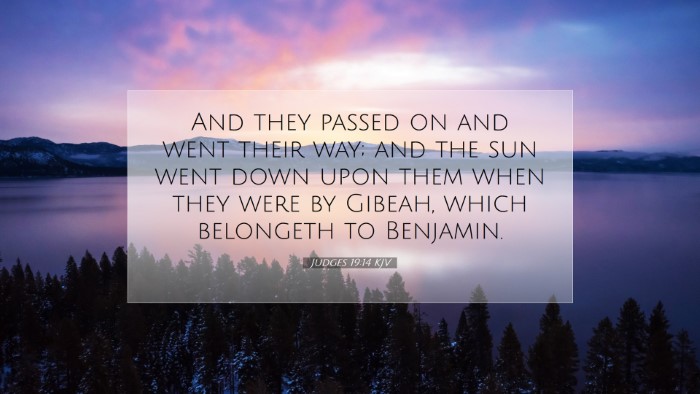Commentary on Judges 19:14
Judges 19:14 reads: "And they passed on and went their way; and the sun went down upon them when they were by Gibeah, which belongeth to Benjamin." This verse transitions to a critical point in the narrative of the Levite and his concubine, setting the stage for the grievous events that follow in the biblical account.
Introduction
The story surrounding Judges 19 is one of the more troubling narratives in the Old Testament, illustrating the moral decay and societal calamities prevalent among the Israelites at that time. This specific verse indicates the Levite's journey toward a city that would become the backdrop for horrific deeds, establishing the thematic elements of darkness both literally and spiritually.
Contextual Background
This chapter occurs during a time of fragmentation and spiritual decline in Israel, often referred to as the time of the judges, when "everyone did what was right in his own eyes" (Judges 21:25). The mention of Gibeah as belonging to the tribe of Benjamin is significant as it sets up the geographic and cultural backdrop that will play a pivotal role in the ensuing calamity.
Historical Context
- Tribal Division: The Benjamites were historically significant yet constantly faced internal strife and external conflict, often leading to their downfall as depicted in other Scripture references (1 Samuel 9:21).
- Religious Decline: The narrative showcases how deteriorated the understanding and practice of divine law had become among the people, necessitating a prophetic voice and divine intervention.
Commentary Analysis
The Journey of the Levite
Matthew Henry notes that the Levite's journey symbolizes the wandering within the moral and spiritual wilderness. His decision to stay in Gibeah signals a lack of discernment, highlighting the lack of hospitality and goodwill towards strangers in Israel during this period.
Significance of Gibeah
Gibeah serves as a representation of the decline of moral sensibility. Albert Barnes emphasizes that this city was once associated with Israel's glory, yet by this point in time had become a locus of sin and depravity. The mention of the sun setting adds a metaphorical layer, indicating the arrival of spiritual darkness.
Insights on Hospitality and Community
Hospitality in Ancient Cultures
In the ancient Near East, hospitality was a sacred law, serving both social and divine purposes. The Levite expected protection and warmth upon entering a city belonging to his kin, yet met with coldness and impending danger, revealing the complete breakdown of societal norms.
Lessons for Today's Believers
Adam Clarke remarks on the importance of how believers today must strive to uphold the principles of hospitality and community. This narrative encapsulates how the failure to acknowledge God’s commandments led to societal chaos, a cautionary tale reminding us of the need for righteous living.
Theological Reflections
The Nature of Sin and Consequences
The descent into depravity faced by the tribe of Benjamin emphasizes the nature of sin as a progressive and communal failing rather than an isolated event. The consequences of abandoning God's ways reverberate through the community, leading to horrific acts that stand as warnings in scripture.
The Role of The Judge
Judges were raised as deliverers in Israel during times of crisis, pointing to God’s faithfulness even in the midst of judgment. This narrative challenges scholars and theologians to consider where the prophetic voices of our time call the church to repentance and restoration.
Conclusion
Judges 19:14 serves as much more than a historical recount of travel; it foreshadows a grave moral tragedy that calls for deep reflection. While the sun sets upon the Levite, it symbolizes a broader spiritual sunset over Israel. In studying this passage, modern readers are urged to remember the importance of faithfulness, community, and the dire consequences of abandoning God's commands.
Further Study
- Explore the consequences of inhospitality in biblical narratives.
- Evaluate the role of community in accountability among believers.
- Consider implications for modern ecclesiology rooted in these ancient texts.


